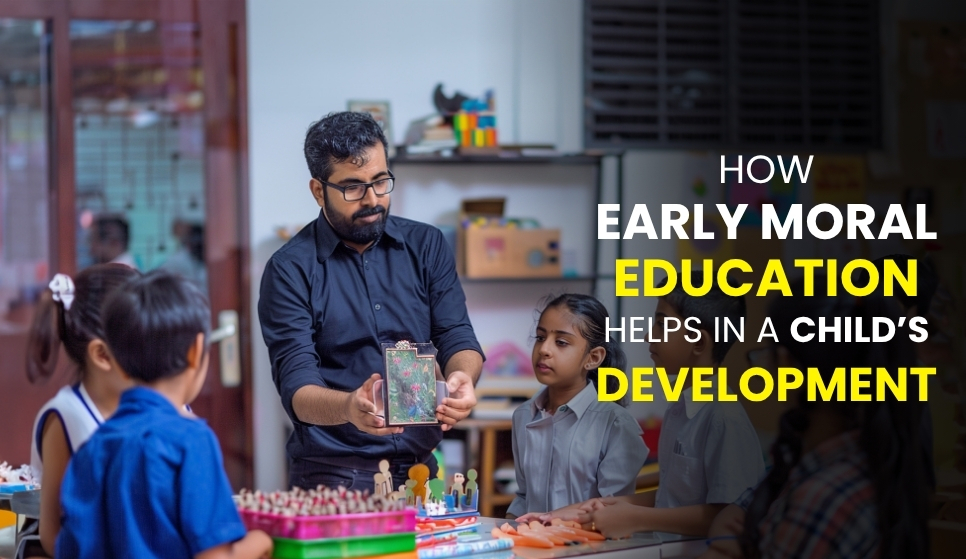Introduction:
Education is one of the most important parts of a child’s life. Early education in a child’s life helps them flourish, develop, and gain knowledge. In today’s harsh world, academic education is not enough to develop a child’s learning; that is why a new type of education, Moral Education, was introduced.
When students learn moral values alongside academic subjects, they develop into responsible citizens who contribute positively to society, which is why, in this blog, we will discuss the importance of early moral education in a child’s life for development.
What is Moral Education?
Moral education means teaching values, ethics, and principles in order for the child to choose what is right and wrong. It emphasizes qualities such as empathy, integrity, responsibility, and respect.
Moral education is not just restricted to textual learning from books but is integrated into several events, classroom discussions, and even on-field situations, promoting character-building with education. This helps students grow individually, learning to respect others, act with kindness, and contribute positively to their communities.
Why Moral Education Should Start Early
Early moral education helps students in the following ways:
1. Character Building Begins Young
The lessons learned at a young age stay for a lifetime. Small habits that students build in their early years help in their life development.
Moral education enables students to choose between right and wrong. It teaches them to be honest, respectful, and kind, and to develop as responsible individuals.
2. Strengthening Emotional Intelligence
Moral education manages their emotions by helping them deal with early failures and being positive and persistent at the same time.
Moral thinking makes them aware of their feelings before others, and they learn how to react accordingly. This emotional intelligence is essential for resolution, empathy, and social interaction.
3. Developing Empathy and Respect
These qualities help individuals develop meaningful relationships based on kindness and mutual respect in society. Learning empathy and respect develops emotional intelligence and creates social harmony.
4. Strengthens Relationships
It helps create a great bond, whether it’s between a parent and child, a teacher and student, or among peers; the basic education in moral law really complements strong and healthy relationships. It teaches honesty, trust, effective communication, and much more.
People Also Read: Modern Education: Exams to Empathy. What Should We Prioritize?
Benefits of Early Moral Education
1. Promotes Discipline and Responsibility
Moral education teaches children to differentiate between right and wrong and to take responsibility for their actions. They grow into individuals who can manage time, follow rules, and make ethical choices even when no one is watching, promoting discipline and responsibility in the students as it used to be in the Vedic period.
2. Encourages Social Harmony
Children who understand moral values like respect, cooperation, and tolerance grow up to be more compassionate and inclusive.
3. Builds Confidence and Better Decision-Making
A child who is morally grounded feels confident about standing up for what is right. Helping them develop strong decision-making skills and are less likely to be influenced by peer pressure or negative surroundings.
4. Strengthens Academic and Emotional Growth
Moral education builds more focus, discipline, and emotional balance as the students get to know how to handle failure, manage stress, and stay motivated, traits that contribute to lifelong success. These skills help them in their academics, too.
5. Shapes Future Leaders and Good Citizens
Moral education helps students to become good citizens and leaders. When students learn respect, honesty, and compassion early, they grow up ready to make a difference in their communities and the world.
Role of Schools and Parents in Moral Development
How Schools Contribute
- Teachers as role models: Young students do what they see. As teachers have been a big part of any student's life, they are counted as role models whom students can look up to and someday be like.
- School culture promoting emotions: In the early years, schools should teach emotional traits like respect, honesty, and compassion, which help them shape up in society’s morality.
- Teambuilding: Giving team projects to the students to make them work with a team and make new friends, while giving them different roles so that they would be able to have moral discussions.
Role of Parents at Home
Parents play a vital role in shaping a child’s moral foundation. Home is the first school, and parents are the first teachers. Here is what they teach you about moral education:
- Setting the right example: Children mirror their parents, so if the parents show kindness, honesty, and empathy, then children will also learn from them and will be kind, honest, and empathetic towards others.
- Encouraging Open Conversations: Parents should discuss topics like fairness, gratitude, and empathy in simple, relatable ways to help their children understand the difference between right and wrong.
- Limiting Negative Influences: Not giving children exposure to digital products in their early childhood can help limit negative influence on the child.
- Reinforcing Good Behavior: Appreciating children and giving them rewards for their right behavior can help them act responsibly or show kindness..
- Creating a Value-Based Environment: A positive atmosphere at home where respect, cooperation, and understanding are practiced daily helps children absorb moral values naturally.
How VVN Promotes Moral Education
At Vivekanand Vidya Niketan, we focus on nurturing responsible, empathetic, and value-driven individuals. Our school integrates moral education into everyday learning. Through value-based lessons, stories, and discussions, students are taught essential virtues like honesty, kindness, discipline, and respect.
We also encourage students to apply these values in real life through community service, cultural events, and national celebrations. Activities such as cleanliness, charity initiatives, and environmental projects teach social responsibility and teamwork, helping them grow into confident, compassionate citizens who make a difference in society.
Conclusion
Moral education helps students to shape up to be future citizens while having empathy, kindness, and honesty in their work and social life. Teaching these traits to students makes them responsible citizens of society.
At VVN, we reinforce child's focus not only on academics but also on building character and humanity. As the values children learn today become the guiding light for the citizens they become tomorrow.
Shaping and guiding the life of a child is a parent's and a teacher's job, and to fulfill this responsibility in the best possible way, you can get the best guidance from VVN. We will help you shape your child’s life. Contact VVN Assandh to know more.
FAQs
1. What is the importance of moral education?
Ans- Moral education is important because it helps the child in building values, ethics, and principles in order for the child to choose what is right and wrong.
2. Who is the father of moral education?
Ans- Johann Friedrich Herbart, a German philosopher and educator, is the father of moral education.
3. What is moral education in early childhood?
Ans- Moral development in early childhood education means understanding and integrating key concepts of fairness, respect, empathy, and compassion.
4. What are the methods of teaching moral education?
Ans- Most studies on teaching strategies for moral education recommend an integration into several events, classroom discussions, and even on-field situations, promoting character-building with education.


